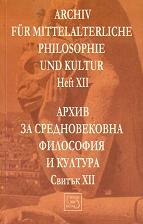Sacred Eroticism and the Play of Identities (Heloise and the “Virgin” Sophia)
Sacred Eroticism and the Play of Identities (Heloise and the “Virgin” Sophia)
Author(s): Oleg GeorgievSubject(s): Philosophy
Published by: Издателство »Изток-Запад«
Keywords: sacred eroticism; identities; Heloise; Sophia; medieval philosophie; Georges Bataille; inword experience; Pierre Abelard; Bernard of Clairvaux
Summary/Abstract: Ancient authors say that, according to Pithagoras, life is like a game in which some participate for the competition, others – to trade, and still others – in order to observe both the competition and human vanity. That was why he thought human life could be presented by the Greek letter Y (the basis symbolises spiritual life, the other two parts – the vanity of the world and earthly pleasures). Some people seek fame, others follow the way of advantage, while still others seek contemplation that alone gives a true knowledge of the world and leads to a worthy. Triadic distinction was also used by Georges Bataille when he described one of the most significantphenomenaofhumanexistence,eroticism. In his book with the same title he speaks of three forms of eroticism, definingthesethreeformsaseroticismofbodies,eroticismof hearts and sacred eroticism. And although, Bataille continues, every eroticism is sacred in a sense, sacred eroticism, in fact, is related to the quest for some continuity of being, systematically followed beyond the direct word, (which) constitutes an essentially religious approach; in its familiar form in the West sacred eroticism is mixed with the striving towards God and more particularly with the love of God”.
Journal: Архив за средновековна философия и култура
- Issue Year: 2006
- Issue No: 12
- Page Range: 64-75
- Page Count: 12
- Language: English
- Content File-PDF

